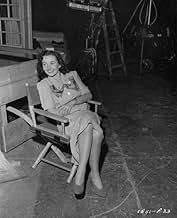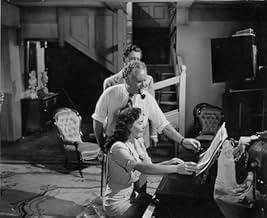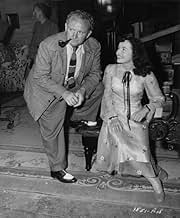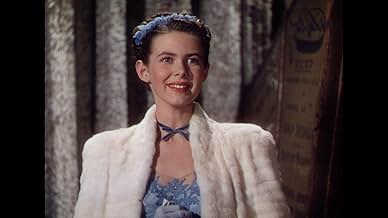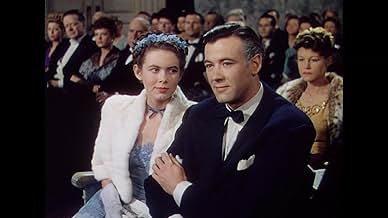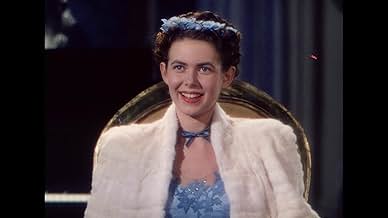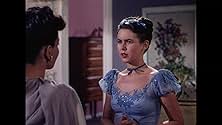CALIFICACIÓN DE IMDb
6.4/10
392
TU CALIFICACIÓN
Una hermosa y joven pianista se debate entre su arrogante maestro de piano y el amor de un joven granjero que la espera en casa.Una hermosa y joven pianista se debate entre su arrogante maestro de piano y el amor de un joven granjero que la espera en casa.Una hermosa y joven pianista se debate entre su arrogante maestro de piano y el amor de un joven granjero que la espera en casa.
- Premios
- 2 premios ganados en total
Bill Carter
- George Sampter
- (as William Carter)
Maria Ouspenskaya
- Madame Goronoff
- (as Mme. Maria Ouspenskaya)
Lillian Bronson
- Music Teacher
- (sin créditos)
Edgar Caldwell
- Call Boy
- (sin créditos)
Paulina Carter
- 12 Year Old Girl
- (sin créditos)
Maurice Cass
- Music Teacher
- (sin créditos)
Charles Coleman
- Butler
- (sin créditos)
Opiniones destacadas
The Dutch actor Philip Dorn plays a concert maestro, Leopold Goronoff, in this film. He's reputed to be one of the greatest pianists of his age....and he definitely has the ego for this...and then some! An old friend convinces Goronoff to take on a student and Myra (Catherine McLeod) is amazing. Eventually, she has her debut and Goronoff is angry because she is so good...perhaps better than him! What a putz! Despite this, Myra is in love with her mentor....and what chance does her childhood friend, George, have with her?
There are several problems with the film, though on balance the movie isn't bad. There are too many long and intense piano pieces and editing them down a bit or allowing for some lighter classical pieces would have helped the film. Additionally, Dorn's character is simply too awful to care about him and there is no reason for Myra to care about this jerk..none.. It's also very slow and the film doesn't seem to know when to end. On the plus side, McLeod is amazing on the piano, the Technicolor is amazingly good and the basic story is quite sound.
There are several problems with the film, though on balance the movie isn't bad. There are too many long and intense piano pieces and editing them down a bit or allowing for some lighter classical pieces would have helped the film. Additionally, Dorn's character is simply too awful to care about him and there is no reason for Myra to care about this jerk..none.. It's also very slow and the film doesn't seem to know when to end. On the plus side, McLeod is amazing on the piano, the Technicolor is amazingly good and the basic story is quite sound.
...and I always will...
Some say his post WW2 works were inferior to the thirties major works .Perhaps so.But it is no reason to dismiss them.
"I've always loved you" is unique,it defines music as a way of communicating emotions.Leopold and Myra use Rachmaninoff (mainly "Second" ),Beethoven ,Lizt and other musicians to express their admiration,their tenderness,their love,their jealousy,their pride,their lust for life,their hate,their contempt ,you name it.In the central scene ,where Myra plays the piano with Leopold's full symphonic orchestra is a real desperate fight ,probably the best concert scene ever filmed (with the eventual exception of Hitchcock's "the man who knew too much" (1956))And that scene is followed by another one where the two musicians ,although miles apart ,continue their "conversation" in a strange telepathy.
The audience who knows Borzage's earlier works (such as "three comrades" "little man what now?" "mortal storm" "cargo" ...) might be disoriented while watching the beginning of the movie .But the master's touch is still here.
Two elements are Borzagesque:the first is George's character.He is akin to Hans ("little man" ) and to the "three comrades" .He is the man who believes in true love ,the simple man who is like a bull in a china shop when he attends the first concert but whose heart is always in the right place.
And the other one is Mme Maria Ouspenskaya (she is granted a "Mme" during the cast and credits!) who was the unforgettable mother of Martin (James Stewart) in Borzage's memorable "mortal storm" .Here she portrays Leopold's mother with authority.Her death is a great moment of delicacy when the music stops in her hand.
Probably not as appealing as Borzage's earlier works,this film is yet waiting to be rediscovered.
Some say his post WW2 works were inferior to the thirties major works .Perhaps so.But it is no reason to dismiss them.
"I've always loved you" is unique,it defines music as a way of communicating emotions.Leopold and Myra use Rachmaninoff (mainly "Second" ),Beethoven ,Lizt and other musicians to express their admiration,their tenderness,their love,their jealousy,their pride,their lust for life,their hate,their contempt ,you name it.In the central scene ,where Myra plays the piano with Leopold's full symphonic orchestra is a real desperate fight ,probably the best concert scene ever filmed (with the eventual exception of Hitchcock's "the man who knew too much" (1956))And that scene is followed by another one where the two musicians ,although miles apart ,continue their "conversation" in a strange telepathy.
The audience who knows Borzage's earlier works (such as "three comrades" "little man what now?" "mortal storm" "cargo" ...) might be disoriented while watching the beginning of the movie .But the master's touch is still here.
Two elements are Borzagesque:the first is George's character.He is akin to Hans ("little man" ) and to the "three comrades" .He is the man who believes in true love ,the simple man who is like a bull in a china shop when he attends the first concert but whose heart is always in the right place.
And the other one is Mme Maria Ouspenskaya (she is granted a "Mme" during the cast and credits!) who was the unforgettable mother of Martin (James Stewart) in Borzage's memorable "mortal storm" .Here she portrays Leopold's mother with authority.Her death is a great moment of delicacy when the music stops in her hand.
Probably not as appealing as Borzage's earlier works,this film is yet waiting to be rediscovered.
Borzage's romantic melodrama follows a gifted young (female) pianist torn between her egomaniacal maestro and the absurdly good young farm boy she grew up with (played by a creepy, almost psychopathically serene Bill Carter). The music is really played by Arthur Rubinstein (who was given a huge paycheck for the time, especially considering the studio, Republic pictures, whose first color film this was) and features some great - if in the end excessive - pieces by Rachmoninoff and others. The characters are ultimately uninteresting and so sadly it hardly matters who ends up with whom, though everyone tries their best. It's all very nice though ultimately forgettable. The highpoint of this rather lavish production is the beautiful technicolor cinematography, which is quite nicely captured in the print restored by UCLA that is used on the laserdisc and VHS tape editions.
I love Frank Borzage's films (STREET ANGEL, 7TH HEAVEN, A FAREWELL TO ARMS, DESIRE, THREE COMRADES, THE MORTAL STORM being my favorites). Borzage was a director of immense talent and sensibility, a true master in every sense. I'VE ALWAYS LOVED YOU is his most lavishly produced film, in glorious Technicolor, and contains extremely beautiful sequences, but unfortunately falls short of being a great work. Borden Chase, the screenwriter, must be responsible for this, as he presents the character of the great Maestro Goronoff as not only arrogant, which could be easily understood, but also immature and frankly ridiculous in his womanizing, thus rendering him a type of buffoon most of the time. One can never understand the love that Myra Hassman feels for him, in spite of Catherine McLeod's fine performance. Thus, when the story reaches its first climax and Goronoff tries to steal the brilliance of his pupil first public concert (in Carnegie Hall, of all places) out of sheer jealousy, the impact of the scene is lessened. We never see the somber shades of his personality creeping in. The effect is incongruous. We cannot take this man seriously. Philip Dorn does not help, either. His acting is unnatural, a pure caricature that does not let a possible tragic dimension of his character shine through. Too bad. The ending is satisfying, at least, and we are left with the lovely image of Catherine McLeod in our memory. She was indeed a good actress and deserved to have had a more successful career.
Catherine McLeod gives a terrific star performance as the luscious center of this ambitious romance film from Frank Borzage.
McLeod plays a young pianist of promise who comes under the wing of a famous and slightly crazed pianist (Philip Dorn) whose demands are limitless. She leaves behind her father's farm and the man (William Carter) who loves her selflessly. Will she marry the mad musician or the simple farmer? More than a standard "woman's picture" or romance, this film features role reversals among the male characters with the lusty, aggressive pianist battling the effete and quiet farmer for the girl's affections. There's also this weird synergy between the girl and the pianist because they share the same passion for music while she seems to have nothing at all in common with the farmer .... except love.
McLeod gives a star-making performance and looks great, but her career never quite took off. Dorn and Carter are perfect as the men orbiting her. Co-stars include Maria Ouspenskaya, Fritz Feld, Felix Bressart, Elizabeth Patterson, Lewis Howard, Vanessa Brown, and Cora Witherspoon. And yes that's the young Andre Previn as the student Dorn dismisses.
Maybe not a masterpiece, but this film from Republic, filled with great music and filmed in lush Technicolor, shouldn't be among the forgotten.
McLeod plays a young pianist of promise who comes under the wing of a famous and slightly crazed pianist (Philip Dorn) whose demands are limitless. She leaves behind her father's farm and the man (William Carter) who loves her selflessly. Will she marry the mad musician or the simple farmer? More than a standard "woman's picture" or romance, this film features role reversals among the male characters with the lusty, aggressive pianist battling the effete and quiet farmer for the girl's affections. There's also this weird synergy between the girl and the pianist because they share the same passion for music while she seems to have nothing at all in common with the farmer .... except love.
McLeod gives a star-making performance and looks great, but her career never quite took off. Dorn and Carter are perfect as the men orbiting her. Co-stars include Maria Ouspenskaya, Fritz Feld, Felix Bressart, Elizabeth Patterson, Lewis Howard, Vanessa Brown, and Cora Witherspoon. And yes that's the young Andre Previn as the student Dorn dismisses.
Maybe not a masterpiece, but this film from Republic, filled with great music and filmed in lush Technicolor, shouldn't be among the forgotten.
¿Sabías que…?
- TriviaThis was Republic's first feature in Technicolor.
- Créditos curiososThe Republic Pictures logo does not appear on this film.
- ConexionesSpoofed in It's a Grand Old Nag (1947)
Selecciones populares
Inicia sesión para calificar y agrega a la lista de videos para obtener recomendaciones personalizadas
Detalles
- Tiempo de ejecución1 hora 57 minutos
- Color
- Relación de aspecto
- 1.37 : 1
Contribuir a esta página
Sugiere una edición o agrega el contenido que falta

Principales brechas de datos
By what name was Siempre te he querido (1946) officially released in India in English?
Responda
